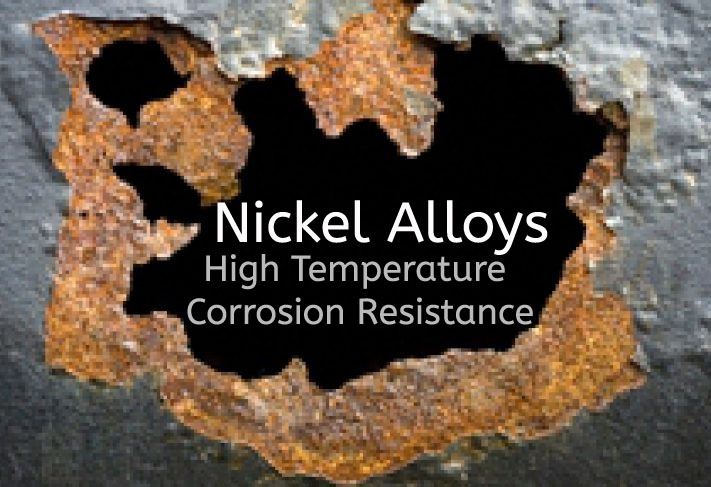
Nickel alloy screws and bolts play an important role in industry but the difference amongst the many alloys is confusing. This blog will try to help clarify the nickel fastener segment. We’ll cover the most common nickel alloys used for screws, as well as their differences, uses and benefits.
What is a Nickel Alloy Bolt?
Nickel alloys are a special class of metal alloys which contain a high content, often greater than 20% nickel. This makes them particularly useful in preventing corrosion from both acids and salt water environments as well as very stable in high temperature environments. As a result, nickel screws and bolts are best known for their unique combination of high strength and corrosion resistance at elevated temperatures. The most commonly used nickel alloy fasteners are:
In addition to nickel, many of these nickel alloys also contain specific amounts of chromium, molybdenum and iron which enhance their corrosion resistance, strength and high temperature stability. Having a higher chromium content helps to provide resistance to oxidizers and the addition of molybdenum enhances the resistance to reducing acids.
Hastelloy
Hastelloy bolts are geared for corrosion protection and are available in a wide range of “flavors” specializing in various acids. Hastelloy C276 is the most common and versatile, offering protection to a wide range of harsh reducing and acidic environments; and are often selected for use in sulfuric and hydrochloric acid. Hastelloy C276 bolts also offer complete resistance to salt water and chlorides. Where C276 can only handle moderate oxidizers, Hastelloy C22 bolts are known for their usefulness in oxidizing media such as ferric acids. They offer a high level of protection from wet chlorine and are also unmatched in their resistance to pitting and crevice corrosion. Hastelloy B2 fasteners are best utilized in hydrochloric acids across most temperatures and concentrations. B3 offers similar resistance with enhanced thermal stability.
Incoloy
Incoloy bolts are designed for long-term high temperature exposure with good corrosion resistance and are often used with combinations of seawater, brine, sour gas and high chloride environments at elevated temperatures. Incoloy is often looked at as an economical alternative to Inconel bolts; but with lower price they also offer lower corrosion resistance, strength and temperature capabilities.
Incoloy 800 is ideal for prolonged, continuous high temperature exposure and good strength, even in moderate acidic environments. Incoloy 800H offers improved stress rupture properties and 800HT enhanced high temperature properties. Incoloy 800 is usable to 1100° F, where 800H and 800HT are normally used in temperatures above 1500°F.
Incoloy 825 differentiates itself with improved corrosion resistance, yet still offering high temperature capabilities to 1000° F. Fasteners made from alloy 825 are resistant to a wide range of reducing and oxidizing media, especially sulfuric and phosphoric acid, as well as chlorides. Age-hardened, Incoloy 925 bolts are a further improvement on sister alloy 825 providing increased strength. They are best used when a combination of corrosion resistance and strength are needed.
Inconel
Inconel bolts offer industry considerable improvement in corrosion resistance and strength on Incoloy and Alloy 20 fasteners. In terms of corrosion resistance, Inconel 625 approaches the level of resistance offered by Hastelloy C276. Inconel 625 bolts prevent, stress, crevice and pitting corrosion, it is utilized in a diversity of corrosive environments including sulfuric, hydrochloric and phosphoric acids dependent on temperature and concentration. In mild corrosive environments such as fresh or salt water, neutral salts and alkaline media, they are almost completely resistant. When comparing Inconel 625 to 718, they are similar in corrosion resistance, but 718 bolts are age-hardened offering more than twice the strength: 625 has yield strength of 84ksi and 718 has yield strength of 180ksi.
Monel
Monel fasteners are most widely used for their resistance to salt water environments. They service a similar temperature range as AL6XN and Alloy 20 with a maximum temperature of 1100F. Monel 400 is ideal for marine and chloride environments, as well as high temperature, caustic and salt solution applications. One of the greatest attributes of Monel is its ability to withstand hydrofluoric acid, which will even attack solid tantalum. Monel can withstand all concentrations of hydrofluoric acid, even up to the boiling point. Monel K500 is an age-hardened form of its sister alloy 400. It offers the same corrosion resistance with increased strength and hardness. Monel K500 has approximately 3 times the yield strength (110ksi vs 45ksi) and double the tensile strength (160ksi vs 83ksi) when compared 400.
Nickel 200
Mostly used in applications that deal with caustic soda, nickel 200 fasteners are made from commercially pure nickel. In addition to their resistance to caustic alkali solutions, these fasteners can also hand anhydrous hydrofluoric acid.
Waspalloy
Though not known for corrosion resistance as most nickel alloys, Waspalloy bolts find their niche as an extreme high temperature alloy. Waspalloy offers excellent oxidation resistance to 1600F – exceeding that of Inconel 718. It is ideal for gas turbine and aerospace applications.
